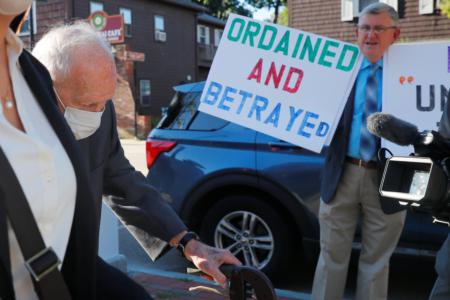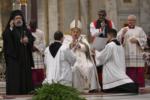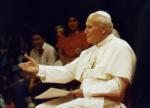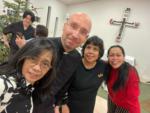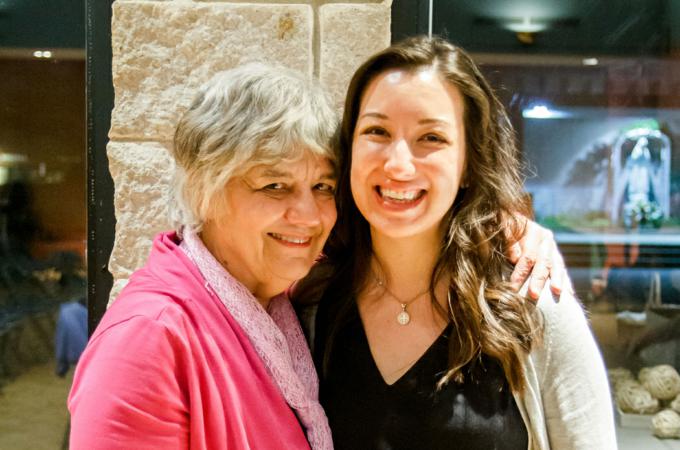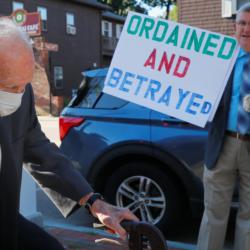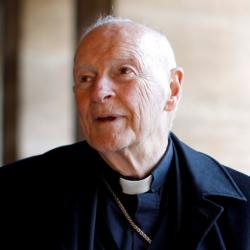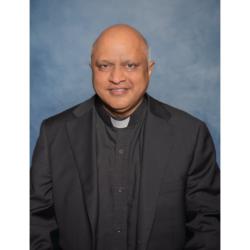Talks explore dimensions of 'Feminine Genius'
CAMBRIDGE -- About 130 people came to St. Anthony Parish on May 1 for "Feminine Genius," an evening to hear two speakers talk about a Catholic understanding of femininity and feminism.
Liz Cotrupi, director of the Office of Family Life and Ecclesial Movements, which sponsored the event, said it was in honor of the 50th anniversary of "Humanae Vitae."
The Office previously held an event focusing on the sexual revolution and the MeToo movement in the fall.
"We thought this would be a good sort of follow-up to that," Cotrupi said.
Cotrupi's daughter, Lizzie Cotrupi Pfunder, provided music, leading the attendees in worship songs before the speaking program began.
The first speaker was Stephanie Calis, a natural family planning instructor and author of "Invited: The Ultimate Catholic Wedding Planner." She is the co-founder and editor-in-chief of Spoken Bride, an online ministry for Catholic brides and newlyweds.
She explained that John Paul II coined the phrase "feminine genius" in his "Letter to Women," in which he wrote about the dignity and vocation of women. She said she was also drawn to his book "Love and Responsibility," which he wrote when he was a cardinal.
"I had never heard before that love could have any opposite besides hatred, and from this book I heard for the first time the idea that another opposite could be utility, using another person for your own self-serving ends," Calis said.
Calis said that for a long time she thought that to be feminine she had to be passive. She said she overanalyzed the complementarity of her relationships. She eventually overcame the limitations of her thinking by looking to the Virgin Mary. As she grew in Marian devotion through participation in the Militia Immaculata, her understanding of femininity changed. She was drawn to the mystery of the Visitation and the words of Mary's Magnificat.
"It wasn't until I started learning more about the life of Our Lady that I felt kind of released from that and saw what feminine strength can really be," Calis said.
Calis imparted three pieces of advice. One was to practice self-expression, thinking about appearance in a healthy way and keeping in mind that the body is an expression of the soul, as John Paul II taught in his Theology of the Body. Another was to build a culture of encounter, paying attention to people so they feel dignified and acknowledged, even during short interactions. The third was to not get caught up in stereotypes the way she had, because femininity does not mean one thing.
"Complementarity truly means bringing in the both of your strengths," Calis said.
The second speaker was Sue Ellen Browder, a former writer for Cosmopolitan magazine and author of "Subverted: How I Helped the Sexual Revolution Hijack the Women's Movement."
Drawing on a combination of personal experience and research, Browder talked at length about the history she outlined in her book. She said that when she began writing for Cosmopolitan in 1971, the feminist movement and the sexual revolution were two distinctly different things.
"John Paul II told us that, as Christians, we shouldn't totally reject feminism and we shouldn't totally accept it, but we should create a new feminism," Browder said.
Browder said the sexual revolution was largely built on propaganda, which she defined as "not complete lies, but half-truth, selected truth, and truth out of context."
She said that Helen Gurley Brown, the editor-in-chief of Cosmopolitan, taught that hard work and sex separated from love, marriage, and children would set women free. Browder said that most of the stories Cosmopolitan published reflecting this belief were fictitious.
Browder said that even as she promoted the "Cosmo girl" lifestyle, she felt it was not for her. She was happily married and had two children.
"Intuitively, I knew, without articulating it, that a woman is strongest, happiest, and most empowered when she's not left alone and isolated, but when she is interconnected in a strong bond of love with others," Browder said.
She described how Lawrence Lader, a co-founder of NARAL, changed the way Americans thought about abortion. Lader wrote the book "Abortion," which Browder called "a masterpiece of propaganda" and credited it with deceiving two key figures, feminist leader Betty Friedan and Supreme Court Justice Harry Blackmun.
Friedan, who believed feminism ought to include women who choose to become mothers, helped to get abortion in the National Organization for Women's political bill of rights on Nov. 18, 1967. Browder pointed to this event as a turning point, when feminism became intertwined with the sexual revolution.
Blackmun's law clerk, George Frampton Jr., introduced him to Lader's book during the process of writing the opinions for "Roe v. Wade" and "Doe v. Bolton." Blackmun cited Lader's book many times throughout the opinion.
"When he used this book as the very foundation for the history of abortion in 'Roe v. Wade,' he became as a blind man following a blind guide. Lader set himself up as an authority on centuries of abortion legal history, and on two millennia of Catholic teachings about abortion, and Blackmun and his clerk fell for the ruse," Browder said.
She said that pro-life, pro-family feminists "have to reclaim our true history and tell our story, which has long been suppressed and forgotten."
She urged attendees to fast, to pray, and to remember that the sexual revolution and feminism are "two radically separate movements."
"You in the pro-life movement have been faithful for 50 years. And there's no doubt in my mind that if you keep praying and doing what you're doing, you will win this war," Browder said in closing.
After the speaking program, Liz Cotrupi addressed the attendees. She said this topic was particularly relevant now in Massachusetts because the ROE Act is in committee. If passed, the ROE Act would significantly deregulate abortion in Massachusetts.
"One of the reasons why we do something like this is to try to bring an awareness and to say, 'We have been fooled, but fooled no longer,'" Cotrupi said.
